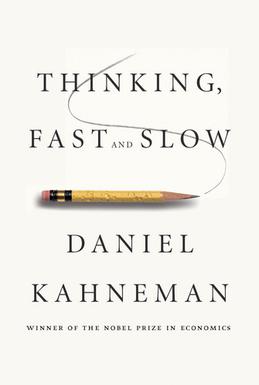


By Steve Sailer
08/24/2017

I was one of the few critics to be less than utterly awestruck by psychologist Daniel Kahneman’s 2011 bestseller Thinking Fast and Slow.
Lately, the chapter in Thinking Fast and Slow on “priming” has come in for severe criticism as celebrated priming experiments, such as how if you show college students word scrambles that include a lot of words about the elderly, they will then walk slower (or maybe faster), have often failed to replicate.
The Replicability-Index blog has a lengthy takedown of the priming chapter in Kahneman’s book:
Reconstruction of a Train Wreck: How Priming Research Went off the Rails February 2, 2017
Authors: Ulrich Schimmack, Moritz Heene, and Kamini Kesavan
Kahneman replied in the comments:
Daniel Kahneman February 14, 2017 at 8:37 pm From Daniel Kahneman
I accept the basic conclusions of this blog. …
What the blog gets absolutely right is that I placed too much faith in underpowered studies. As pointed out in the blog, and earlier by Andrew Gelman, there is a special irony in my mistake because the first paper that Amos Tversky and I published was about the belief in the “law of small numbers,” which allows researchers to trust the results of underpowered studies with unreasonably small samples. …
My position when I wrote “Thinking, Fast and Slow” was that if a large body of evidence published in reputable journals supports an initially implausible conclusion, then scientific norms require us to believe that conclusion. …
I knew, of course, that the results of priming studies were based on small samples, that the effect sizes were perhaps implausibly large, and that no single study was conclusive on its own.What impressed me was the unanimity and coherence of the results reported by many laboratories. I concluded that priming effects are easy for skilled experimenters to induce, and that they are robust.
However, I now understand that my reasoning was flawed and that I should have known better. Unanimity of underpowered studies provides compelling evidence for the existence of a severe file-drawer problem (and/or p-hacking). The argument is inescapable: Studies that are underpowered for the detection of plausible effects must occasionally return non-significant results even when the research hypothesis is true — the absence of these results is evidence that something is amiss in the published record. …
I still believe that actions can be primed, sometimes even by stimuli of which the person is unaware. There is adequate evidence for all the building blocks: semantic priming, significant processing of stimuli that are not consciously perceived, and ideo-motor activation. I see no reason to draw a sharp line between the priming of thoughts and the priming of actions. …
Think of “priming” as a euphemism for “manipulability.” Is it plausible that college students could be manipulable?
Yes. Definitely yes.
Rock stars, for example, are, more or less, experts at manipulating college students.
Is it plausible that people are consistently, endlessly manipulable in important ways by simple minded tricks repeated over and over?
Maybe, maybe not. And certainly less as time goes by.
For ten years, for instance, Jerry Lewis could manipulate America into howling with laughter. For the next fifty years, not so much.
Further, some people are better than other people at manipulating, and who primes whom is highly variable.
My guess is that manipulation is very real, but also expensive and hard to do, especially over time. There’s always a manipulation arms race going on.
Scams get tired, so you need new scams.
For example, here’s an article from some site called The Outline about some other site called Mic:
For about five years, Mic.com was a place where readers could go to get moral clarity. In the Mic universe, heroes fought for equality against villains who tried to take it away. Every day, there was someone, like plus-size model Ashley Graham, to cheer for, and someone else, like manspreaders, to excoriate. Kim Kardashian annihilated slut shamers, George Takei clapped back at transphobes. “In a Single Tweet, One Man Beautifully Destroys the Hypocrisy of Anti-Muslim Bigotry.” “This Brave Woman’s Horrifying Photo Has Become a Viral Rallying Cry Against Sexual Harassment.” “Young Conservative Tries to Mansplain Hijab in Viral Olympic Photo, Gets It All Wrong.” “The Problematic Disney Body Image Trend We’re Not Talking About.” “The Very Problematic Reason This Woman Is Taking a Stand Against Leggings.” …
The success of personal, identity-driven essays like “5 Powerful Reasons I’m a (Male) Feminist,” “An Open Letter to the Pope From a Gay Man,” and “An Open Letter to Abercrombie and Fitch from a Formerly Homeless Kid” inspired Mic to launch an “Identities” section in October 2013 “dedicated to examining the intersections of sexuality, gender, class and race in politics and culture for the millennial generation.” These stories got traction on Facebook, so Mic replicated them, attracting more social justice readers as well as more social justice writers, who then wrote more social justice stories. “Mic realized earlier than most places that they could commodify people’s feelings about race and gender,” was the view of one early staffer who has since left.
But now readers have started to get tired of this kind of priming, so Mic is pivoting to some other kind of priming.